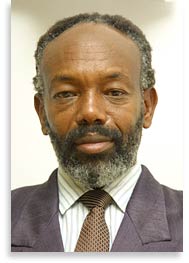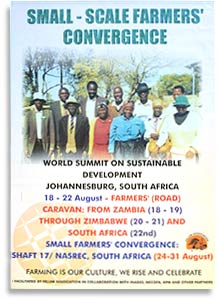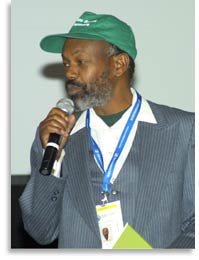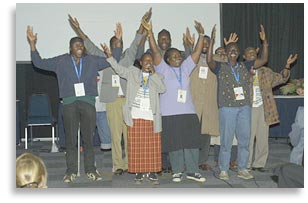|
Justus Lavi Mwololo
Speaks About Kenya’s Agriculture “Farmers, we have to put forward our agenda” Johannesburg, South Africa
Nobody is going to do anything for us Justus Lavi Mwololo: My name is Justus Lavi Mwololo. I come from Kenya and my organization is Abodi Anglican. We offer community services to the society. We work in conjunction with the Anglican Church of Kenya. We are here in South Africa, Johannesburg, to promote and to push forward our agenda of sustainable development, particularly in agriculture. In Kenya, it is two-fold. One side is crops and the other side is livestock. We have had a lot of problems in both. Earlier, say about twenty years ago, Kenya’s situation was very favorable and it was going positively towards building up small-scale farmers. But as days went on, as years have passed, things have changed. Now what we have is a situation which is not farmer friendly. To clear out this we have found that we farmers have to come out. Farmers, we have to put forward our agenda. Farmers, we have to be prepared to do things ourselves because we have come to realize that nobody is going to do anything for us. International financial policy
These type of policies that are drawn, once they come to a country passing through our government, they effect the small-scale farmer. And since the small-scale farmer, his voice is small, he cannot be heard, he ultimately finds himself doing what they say. Now, we have a policy like the one brought by the World Trade Organization that forces our government and many other governments to remove subsidies while European countries and the USA/Canada they are subsidizing their farmers. Their farmers are big. Their farmers have access to credit. Their farmers have access to market. Their farmers are supported by their government. This sort of action has made the small-scale farmers have very difficult times. We are not able to access credit because banks have stringent measures that effect farmers who want credit. For instance, the borrowing, the money that the banks come to lend in our country, this money comes from, say, London. Major banks meet in London and from time to time they fix their interest rates. Normally their interest rates are quite low, say eight to nine percent, but when that same money comes down to Kenya it is fetching interest of over 25% with the local banks. If it comes to other financial institutions with the bank or with the government, the same. It becomes very difficult for the small-scale farmer if he goes for this type of finance. It’s totally unfriendly to farmers. The market for coffee has slumped There are other issues. We have had issues with farmers that effect farmers inputs and effect farmers’ outputs. By inputs I mean the activities that help the farmer to cultivate and plant their crops. These are things like fertilizers, tools and equipment, technologies, all these sort of things. At the end, when the farmer is harvesting because the crops have been grown on an expensive system, the final product is expensive. And the farmer cannot sell. Recently, we had one case in Kenya. Farmers who grow maize they had very good produce but then suddenly we are informed there is no market price. And farmers had to sell at a loss.
We have had the same problem with sugar. We had the same problem with cotton. We are having the same problem with our dairy market. A lot of milk has no market. But the farmer has to keep the animals. The farmer has to plow the fields because the farmer has no other activity. So you find that the farmer gets poorer and poorer because here the farmer is inputting his money but there is no return. And the families of farmers grow poor also. Children cannot go to proper schools. Children cannot dress well. Children cannot have good food to eat. This predicament is surrounding the farmer. Now, there are other issues also. Farmers, small-scale-farmers, they are forced to compete with large farmers, say farmers from USA, who are subsidized. Their products reach Kenya and we find that American products after traveling so many thousands of kilometers yet they are cheaper in Kenya than Kenyan products. For example, – I was talking about fertilizer. The Kenyan coastal port is Mombasa. Fertilizer comes from USA by ship to Mombasa and then is shipped from Mombasa to the interior of Kenya by truck -- a journey of eight hours. But it is more expensive to transport fertilizer from Mombasa to the interior of Kenya than transporting it from USA to Mombasa by ship. There are many factors which affect the farmer. If a farmer has to have a tractor, spares are very expensive. Fuel for the tractor is very expensive. The mechanics are very expensive. Everything that is being used by the farmer to produce the product is very expensive. Even pen and paper are very expensive. All this adds on to the expense of the final product of the farmer. Now, the small-scale farmer because of their faith, they have got nothing. We have socio-economic issues. We have politics in it. There is ritual in it. Small-scale farmers have to deal with these effects – the social-economic, political and technical also. We have found that small-scale farmers they are taken as a tool and they are used by other people who take whatever they have and they make more money. They make more profits. Throw-away prices and the European market Take the case of small-scale farmers who plant vegetables that get exported to Europe. We have farmers that grow French beans. These French beans go to Europe. But the farmer has no access to the European market. There in Europe, take for instance in London, there are people who have negotiated with buyers in Europe, and they come running down to Kenya. They come and buy the farmers’ produce at throw-away prices because they have blocked the market in Europe. They buy the farmer’s product at throw-away prices and they rush it to their European market and sell it at very lucrative prices. The farmers whose product are being bought at such a low rate cannot sustain their farming, because they are not getting enough money. Farmers who are involved in horticultural farming have grown poorer and poorer. Some of them have gone out of farming. Others are doing it because they have to do it. Others have borrowed. Families are in disarray. We are breaking the family bond because of this type of activity. A further issue is the lack of government support. The leaders that we have, say in Africa, are interested more in national issues than they are interested in small-scale farmers. Because some of them are also big farmers, you see. Some of them are in touch with the big companies. So the small-scale farmer who has to suffer, who has access to nowhere, remains suffering. He grows poorer and the rich ones grow richer. There are very many issues that we are highlighting here. Livestock farmers, private buyers and high costs
We have other problems we have observed. Animals have to be taken care of. There are chemicals, medicines, animal drugs – with time those have become very expensive. They have become more expensive and more expensive. But what is the price of the final product? You find that at the end of the work being done the farmer is at a loss. But still the farmer has got no other occupation. He has to continue doing it at a loss. The farmers have got no other alternative. They have to continue to farm, because the farmer has the land and if one season passes without taking care of the land or without taking care of the animals either the animals will die or if it is a cultivated piece of land it will turn to bush. GMOs – genetically modified organisms Now there is this new issue that we are having of GMOs – genetically modified organisms – that have come to our farms. I have particular experience with the maize, in America it is called corn, that has been introduced by Pioneer. It is a very beautiful breed, species to look at. When it is planted it will give three to four cobs. But there are requirements to it. It requires a lot of fertilizer – first. It may require spraying – secondly. But thirdly, and the most crucial, is that it requires heavy rain. And in Africa most of the countries are drought prone. I’ll take the example of Kenya. We have only one good rain of one and half months and it is not enough for this variety of Pioneer. Pioneer requires rain of about three months. So those who have tried to plant it they have found that within the first two months it will do well. After that it will start drying up and the yield will be very poor. This is in contrast to the local species, the traditional species, they don’t give those big cobs. But the traditional species will ripen and they will be ready to harvest within three months. We know there will be rain or there will be no rain, but we know with our traditional species we’ll harvest something and a famine will not be there. We will not have famine. People are not going to starve.This is one thing that we have seen with the GMOs. A variety like this that I have mentioned of Pioneer that variety is going to go on because GMOs are dominant genes. Within the next few years it will have dominated the traditional species at the same time it will have grown into the local species. It will have polluted the local species and what we are going to have is the local species dead. We’ll have a new species that is a hybrid of Pioneer and traditional species and this will not be able to withstand the drought of Africa. I am just highlighting maize because I have good experience with it. We have seen this in animals also – dairy cows.
I am just highlighting some of the problems that we have been facing. We are fighting and we are highlighting some of the consequences that we have seen with the GMOs. Some that we know. Some that we don’t know. The future of GMOs is not known. Scientists and the big companies who are researching and developing GMOs, they themselves do not know what is the future in them. What will happen in five years? What will the effect be on human beings. The effect on animals. The effect on the natural systems. We want farmers who are ultimately going to be the target of GMOs to be involved. We want them invited to research stations. We want them consulted because they are ultimately the ones who are going to be users. What is happening is the GMO companies they are doing this for the sake of profit because they are making a lot of money and in every area they want to have control. I spoke of the case of corn/maize in Kenya. They want to control the corn availability. There is one species that they were developing – Terminator. What it is supposed to do, is that after planting it once, you cannot plant it again. Next season you have to go to the shop and buy more seeds. But the Kenyan farmer and the African farmer are used to having their seed and after every season selecting the best seed from their own seed bank and going and planting again. We are talking of attaining food security in Africa and food security in Africa can be obtained in only one way. To get the local farmers, the small-scale farmers to become independent. By this, I’m calling to the NGOs, I’m calling to governments, I’m calling to the international financial institutions, the local financial institutions to be positive. The requirement of Africa today is not GMOs. The requirement of Africa today is water. Because Africa, we have got beautiful land. We have got very fertile land and if this land has enough water we can grow crops and the food shortage problem of Africa is solved. Again, I’m giving the example of Kenya. In Kenya we have several dams. Huge ones for hydro-electricity. Of course, in Kenya we don’t have heavy rain. But when there is rain, well just a good amount, we have seen many times the dams become full. When the dams have become full the hydro-electricity authorities they open the gates of the dams and all the excess water goes to the sea. The thing that I am advocating, and that I am urging, is that this water instead of being let go down to the sea, it should be diverted and sent to the dry areas to irrigate those areas. Crops will be grown. Animals will be grown. We will have more crops. We will have better animals. These are some of the solutions. If they are applied and implemented then we can have a solution to Africa’s food shortage. These solutions are not very expensive if we compare them with the money that is being used in policy formulations. If we compare them with the money that is put into research. That same money, or even half of that money, can be put into water and we’ll have enough use. Nobody is addressing the issue this way because that water will not be profiting, will not be benefiting certain individuals or certain big groups that have the money. What we are talking about, this is the sort of action that is going to result in sustainable development in agriculture. Thank you. |
|||||||||||||||||||||||||||||||||||||||||||||||||||||||||||||||||||||||
| Published in In Motion Magazine, March 15, 2003 | |||||||||||||||||||||||||||||||||||||||||||||||||||||||||||||||||||||||
If you have any thoughts on this or would like to contribute to an ongoing discussion in the  What is New? || Affirmative Action || Art Changes || Autonomy: Chiapas - California || Community Images || Education Rights || E-mail, Opinions and Discussion || En español || Essays from Ireland || Global Eyes || Healthcare || Human Rights/Civil Rights || Piri Thomas || Photo of the Week || QA: Interviews || Region || Rural America || Search || Donate || To be notified of new articles || Survey || In Motion Magazine's Store || In Motion Magazine Staff || In Unity Book of Photos || Links Around The World NPC Productions Copyright © 1995-2018 NPC Productions as a compilation. All Rights Reserved. |
|||||||||||||||||||||||||||||||||||||||||||||||||||||||||||||||||||||||






